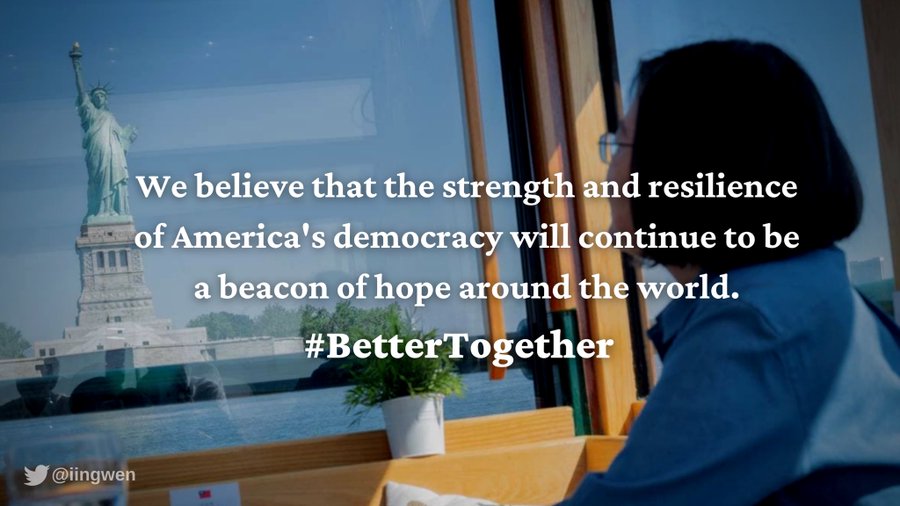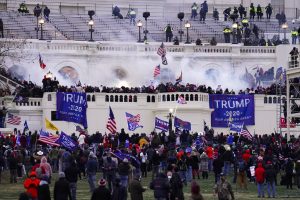On January 6, a mob Trump supporters stormed the U.S. Capitol in an attempt to disrupt the formal certification of President-elect Joe Biden’s victory – and thus President Donald Trump’s loss. Trump had spread baseless conspiracy theories about electoral fraud, refused to concede the election, and on January 6 encouraged the protesters to march on the Capitol. The violence sparked horror around the world, with a number of government issuing swift condemnations.
Below, The Diplomat has collected official statements from governments in our coverage region on the incident. We will be updating this piece throughout the week as new statements are issued (last updated on Jan. 11).
To set the tone, a statement from U.S. Secretary of State Pompeo himself – a Trump appointee – on Twitter: “The storming of the U.S. Capitol today is unacceptable. Lawlessness and rioting — here or around the world — is always unacceptable. I have travelled to many countries and always support the right of every human being to protest peacefully for their beliefs and their causes. But violence, putting at risk the safety of others including those tasked with providing security for all of us, is intolerable both at home and abroad. Let us swiftly bring justice to the criminals who engaged in this rioting. America is better than what we saw today at a place where I served as a member of Congress and saw firsthand democracy at its best.”
Australia
- Australian Prime Minister Scott Morrison on Twitter: “Very distressing scenes at the US Congress. We condemn these acts of violence and look forward to a peaceful transfer of Government to the newly elected administration in the great American democratic tradition.”
- Foreign Minister Marise Payne on Twitter: “Very concerned by scenes at the US Congress. I condemn any violence to interfere with democratic processes. This will not impede the transfer of power, US institutions are robust & its democratic strength resides in the full breadth of its people who are no part of this violence.”
China
- Ministry of Foreign Affairs spokesperson Hua Chunying in a press briefing on January 7:
“We have noted what’s now unfolding in the United States. We believe that people in the United States certainly hope for an early return of normal order.
You mentioned that four people were reportedly killed in this incident, and you also described some reactions from the Chinese netizens. I would also like to share some of my thoughts with you.
First, Chinese people have the right and freedom to make their opinions and comments online. I believe that for many people, seeing those scenes in the United States has brought back a sense of deja vu, though they brought out some quite different reactions from certain people in the United States, including from some media.
You mentioned the unrest in Hong Kong. On July 2019, radical and violent protesters in Hong Kong broke into the Legislative Council, ransacking the main chamber, smashing facilities, tossing toxic liquid and powder at police officers, and even biting off one police officer’s finger and stabbing another. But the Hong Kong police showed maximum restraint and professionalism and no protester ended in death. You mentioned that there were already four deaths in Washington in what was less violent and destructive than the case in Hong Kong.
If you still remember how some U.S. officials, lawmakers and media described what’s happened in Hong Kong, you can compare that with the words they’ve used to describe the scenes in Capitol Hill. I made a note of some words they used. They all condemned it as “a violent incident” and the people involved as “rioters”, “extremists” and “thugs” who brought “disgrace”. Now compare that with what the Hong Kong violent protesters were called, like “a beautiful sight” you brought up and “democratic heroes”. They said that “American people stand with them”.
What’s the reason for such a stark difference in the choice of words? Everyone needs to seriously think about it and do some soul-searching on the reason.
We believe that the American people still cherish peace and safety, especially when they are still struggling with a difficult pandemic situation. We hope that they will have their peace, stability and safety back as soon as possible.
Besides, I noticed that the spokesperson of the bureau of international exchanges of the China Media Group issued a statement saying that many news outlets, including a Chinese one, were attacked by demonstrators at their usual live positions outside Capitol Hill in Washington, D.C. Our thoughts are with the reporters out there and we call on the U.S. side to take necessary measures to safeguard journalists’ safety.”
- Hua on Twitter: “We hope the #American people could regain their #peace, stability & #safety ASAP.”
Japan
- Chief Cabinet Secretary Kato Katsuonobu in a press conference on January 7 (question asked at 3:19): “We are looking at this cautiously. According to the news media, we found out that a woman has died so we offer our sympathy. Regarding this issue, President Trump has been calling out for the demonstrators to go back home and has been saying that order should be followed and peace should be restored. The president-elect, Mr. Biden, has been calling out for justice. You mentioned about the political strategy of Mr. Trump. But this is about the U.S., therefore as a government we will refrain from making comment. But as for U.S. democracy, I wish that they will restore peace and cooperation and become unified.”
- Motoko Rich, Tokyo bureau chief for the New York Times, also cites Kato as saying: “We expect that the transition of the government will be carried out in a peaceful and democratic manner.”
India
- Prime Minister Narendra Modi on Twitter: “Distressed to see news about rioting and violence in Washington DC. Orderly and peaceful transfer of power must continue. The democratic process cannot be allowed to be subverted through unlawful protests.”
- External Affairs Minister S. Jaishankar retweeted Modi’s comment, but did not write one of his own.
- An Indian news agency tweeted that on January 8, Ramdas Athawale, minister of state for social justice and empowerment, had said: “The incident that took place (at US Capitol) is condemnable. It is not only an insult to the Republican Party but also to America & democracy. That is why we are expressing our displeasure. I will try to speak to him (Trump) over phone.” It is not known whether Athawale has had the occasion to call Trump.
Nepal
- Former Prime Minister Sher Bahadur Deuba on Twitter: “I am shocked by the outrageous scenes at US Congress! The people have spoken – the transition to the next government must be peaceful! We wish the all US citizens peaceful days ahead!”
New Zealand
- Prime Minster Jacina Ardern on Twitter: “Like so many others, I’ve been watching what’s happening in the United States. I share the sentiment of friends in the US – what is happening is wrong. Democracy – the right of people to exercise a vote, have their voice heard and then have that decision upheld peacefully should never be undone by a mob. Our thoughts are with everyone who is as devastated as we are by the events of today. I have no doubt democracy will prevail.”
- Foreign Minister Nanaia Mahuta on Twitter: “We regret unfolding events in Washington DC. Our thoughts are with the American people. Violence has no place in thwarting democracy. We look forward to the peaceful transition of the political administration, which is the hallmark of democracy. Kia tau ngā manaakitanga.”
- And a follow-up tweet from Mahuta: “Aotearoa [New Zealand] welcomes Congressional confirmation of the election of President-elect Biden, reasserting US democratic processes in unprecedented circumstances. [New Zealand] values its strong r/ship w/ [the U.S.] & we look forward to working closely w/President-elect Biden & his team from 20 January.”
Pakistan
- Pakistan’s Foreign Ministry spokesperson in a press briefing: “We are closely following the developments in Washington DC. We are hopeful that the situation will soon normalize and would not in any way impact the ongoing transition process. We also wish to congratulate President-elect Joe Biden on certification of his win by the U.S. Congress.”
South Korea
- A statement from a Ministry of Foreign Affairs spokesperson curiously avoids mentioning the incident at all:
“The Korean government congratulates President-elect Biden and Vice President-elect Harris on the confirmation of the victory in the U.S. presidential election after the U.S. Congress’ certification of the Electoral College results on January 7.
The Korean government looks forward to communicating and cooperating closely with the new Biden administration to further advance the strong Korea-U.S. alliance, achieve denuclearization and the establishment of permanent peace on the Korean Peninsula, and tackle global issues including health security and climate change.”
Taiwan
- President Tsai Ing-wen on Twitter: “In difficult times like these, it’s more important than ever to come together as one. We stand resolutely with all our partners seeking to form a more perfect union. #BetterTogether.” The tweet included an image as well:

- The Ministry of Foreign Affairs on Twitter: “We want to once again congratulate @JoeBiden& @KamalaHarris following certification of the electoral college votes. Events over the past 36 hours have shown the strength & resilience of America’s democracy, which continues to be the beacon of hope around the world. The institutions & democratic processes of the U.S. were built to stand the test of time. Anarchy, disorder & mob rule will never prevail. But democracy & freedom will.”

































